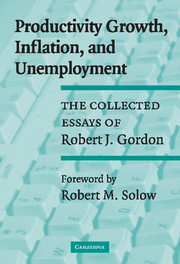Book contents
- Frontmatter
- Contents
- Foreword by Robert M. Solow
- Preface
- Introduction
- PART ONE THE HISTORY, THEORY, AND MEASUREMENT OF PRODUCTIVITY GROWTH
- PART TWO INTERPRETING PRODUCTIVITY FLUCTUATIONS OVER THE BUSINESS CYCLE
- PART THREE THE THEORY OF THE INFLATION-UNEMPLOYMENT TRADEOFF
- Part Three Introduction
- 10 Alternative Responses of Policy to External Supply Shocks
- 11 Supply Shocks and Monetary Policy Revisited
- 12 The Theory of Domestic Inflation
- 13 The Phillips Curve Now and Then
- PART FOUR EMPIRICAL STUDIES OF INFLATION DYNAMICS IN THE UNITED STATES
- Subject Index
- Author Index
- References
11 - Supply Shocks and Monetary Policy Revisited
Published online by Cambridge University Press: 10 December 2009
- Frontmatter
- Contents
- Foreword by Robert M. Solow
- Preface
- Introduction
- PART ONE THE HISTORY, THEORY, AND MEASUREMENT OF PRODUCTIVITY GROWTH
- PART TWO INTERPRETING PRODUCTIVITY FLUCTUATIONS OVER THE BUSINESS CYCLE
- PART THREE THE THEORY OF THE INFLATION-UNEMPLOYMENT TRADEOFF
- Part Three Introduction
- 10 Alternative Responses of Policy to External Supply Shocks
- 11 Supply Shocks and Monetary Policy Revisited
- 12 The Theory of Domestic Inflation
- 13 The Phillips Curve Now and Then
- PART FOUR EMPIRICAL STUDIES OF INFLATION DYNAMICS IN THE UNITED STATES
- Subject Index
- Author Index
- References
Summary
A macroeconomic supply “disturbance” or “shock” is any event which creates an autonomous shift in the aggregate supply curve relating the economywide price level to the level of output or utilization. The autonomous nature of such shifts distinguishes them from other movements in the supply curve that represent the consequences of a current or prior changes in aggregate demand. The distinction between supply and demand shocks is valid only with reference to their origin, whereas the consequences of supply shocks for output and inflation depend fundamentally on the aggregate demand policies that are pursued in their wake.
This paper was written almost a decade after the first attempts in 1974 to develop a theory of policy response to supply shocks. It provides a simple algebraic framework that facilitates a summary of the central issues posed by supply shocks for macroeconomic policy. Primary emphasis is placed on the case for and against monetary accommodation, on the nature and extent of wage indexation, and on the distinction between permanent and transitory shocks. A tight space constraint precludes more than passing mention of cost-oriented fiscal policy, oil tariffs, buffer stocks, and other policies that mainly influence the magnitude of the shocks themselves rather than their consequences for macroeconomic performance. Given the difficult trade-offs faced by monetary policy-makers considering the merits of accommodation, these supply-side alternatives may actually represent the best available policy options. The first line of defense against a real disturbance is a real policy.
- Type
- Chapter
- Information
- Productivity Growth, Inflation, and UnemploymentThe Collected Essays of Robert J. Gordon, pp. 332 - 339Publisher: Cambridge University PressPrint publication year: 2003



